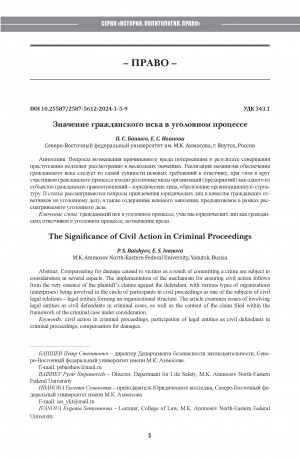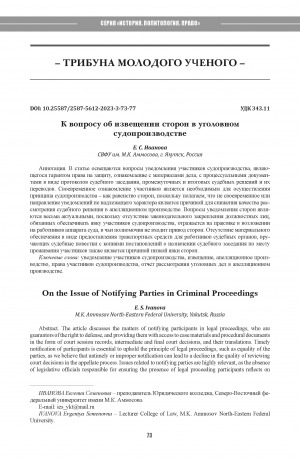Место работы автора, адрес/электронная почта: Северо-Восточный федеральный университет им. М. К. Аммосова, Юридический колледж ; 677013, г. Якутск, ул. Кулаковского, 42 ; e-mail: ivanovaes@s-vfu.ru ; https://www.s-vfu.ru/
Область научных интересов: Государство и право, юридические науки
Источник: Вестник Северо-Восточного федерального университета им. М. К. Аммосова. Серия "История. Политология. Право". - 2025. - N 1 (37)
Количество страниц: 8 с.
Judicial decisions in criminal cases require clear formulation regarding the handling of physical evidence. Law enforcement agencies or other entities responsible for storing physical evidence, as mandated by court decisions, must take appropriate measures to execute these judicial decisions within the deadlines set by the court. This norm is intended to regulate issues related to ensuring the proper execution of judicial decisions in accordance with legislative timelines. However, judicial practice often encounters instances of improper resolution concerning the recognition and safeguarding of physical evidence, which subsequently diminishes the quality of decisions made by first-instance courts. The author investigates the legal nature of physical evidence and the responsibility of authorized individuals for the proper storage of such evidence during preliminary investigations and after a court verdict is rendered. The aim of this study is to clarify the nature of physical evidence in criminal cases, which is also outlined in civil legislation regarding the storage of such evidence. In order to study the reasons for the decrease in quality of examined criminal cases, the author conducts an analysis of the content of reviews of judicial practice concerning criminal cases with guilty verdicts that have been deemed unsound by higher courts due to violations committed by first-instance courts and practical errors made by investigative bodies. To address these violations, an analysis of internal local acts of general jurisdiction courts is conducted, focusing on the subsequent handling of physical evidence that has been transferred for storage. The studied regulations governing the storage of physical evidence in criminal cases are designed to regulate the relationships between law enforcement and judicial bodies concerning proper documentation processes related to physical evidence. Further research into the content and resolution of physical evidence in criminal cases may serve as a foundation for a more detailed analysis of unresolved criminal cases regarding the fate of physical evidence.
Иванова, Е. С. Определение содержания и разрешения вещественных доказательств по уголовному делу / Е. С. Иванова ; Северо-Восточный федеральный университет им. М. К. Аммосова // Вестник Северо-Восточного федерального университета им. М. К. Аммосова. Серия "История. Политология. Право". - 2025. - N 1 (37). - С. 39-46. - DOI: 10.25587/2587-5612-2025-1-39-46
DOI: 10.25587/2587-5612-2025-1-39-46
Количество страниц: 4 с.
The article discusses aspects of conducting audio recording of court sessions and familiarizing the participants with the audio protocol. It explores technical aspects of equipment for audio recording, as well as the issues related to acquainting individuals held in custody. Familiarizing participants with the audio protocol of court sessions is not only a duty of the courts but also the realization of the right to transparency and legality of court proceedings, as well as the right to defense. The article provides an example from the review of appellate court practices in criminal cases, leading to the annulment of the first-instance court verdict.
Иванова, Е. С. К вопросу об аудиопротоколировании судебного заседания/ Е. С. Иванова ; Северо-Восточный федеральный университет им. М. К. Аммосова, Юридический колледж // Вестник Северо-Восточного федерального университета им. М. К. Аммосова. Серия: История. Политология. Право. - 2024. - N 1 (33). - С. 60-63. - DOI: 10.25587/2587-5612-2024-1-60-63
DOI: 10.25587/2587-5612-2024-1-60-63
Количество страниц: 5 с.
Compensating for damage caused to victims as a result of committing a crime are subject to consideration in several aspects. The implementation of the mechanism for ensuring civil action follows from the very essence of the plaintiff’s claims against the defendant, with various types of organizations(enterprises) being involved in the circle of participants in civil proceedings as one of the subjects of civillegal relations – legal entities forming an organizational structure. The article examines issues of involvinglegal entities as civil defendants in criminal cases, as well as the content of the claim filed within the framework of the criminal case under consideration.
Баишев, П. С. Значение гражданского иска в уголовном процессе / П. С. Баишев, Е. С. Иванова ; Северо-Восточный федеральный университет им. М.К. Аммосова, Юридический колледж, Департамент по безопасности жизнедеятельности // Вестник Северо-Восточного федерального университета им.М. К. Аммосова. Серия: История. Политология. Право - 2024. - N 1 (33). - C. 5-9. - DOI: 10.25587/2587-5612-2024-1-5-9
DOI: 10.25587/2587-5612-2024-1-5-9
Количество страниц: 5 с.
Иванова, Е. С. К вопросу об извещении сторон в уголовном судопроизводстве / Е. С. Иванова ; Северо-Восточный федеральный университет им. М. К. Аммосова // Вестник Северо-Восточного федерального университета им. М. К. Аммосова. Серия: История. Политология. Право. - 2023. - N 3 (31). - C. 73-77. - DOI: 10.25587/2587-5612-2023-3-73-77
DOI: 10.25587/2587-5612-2023-3-73-77



